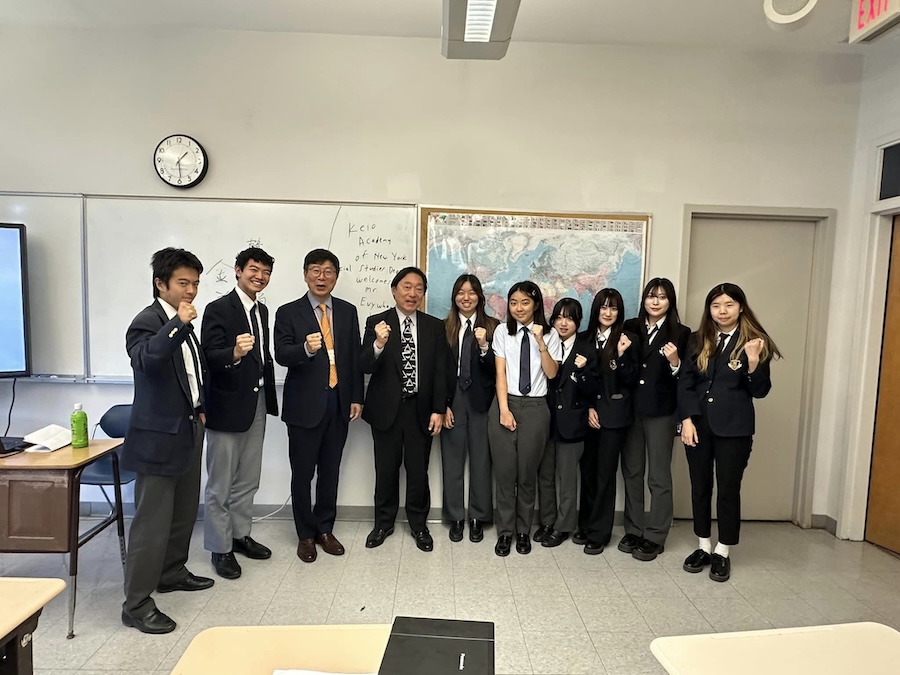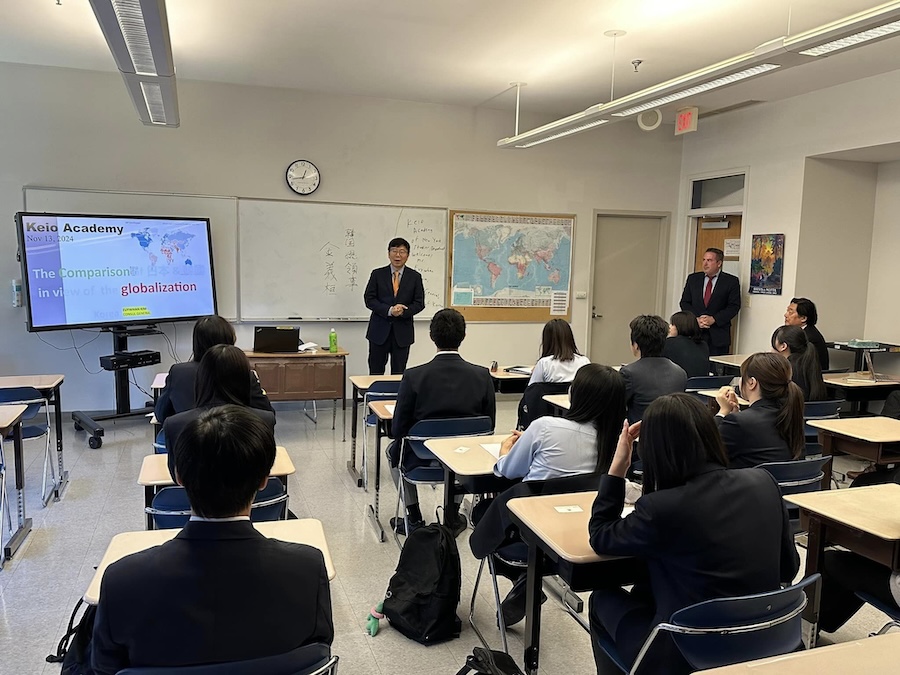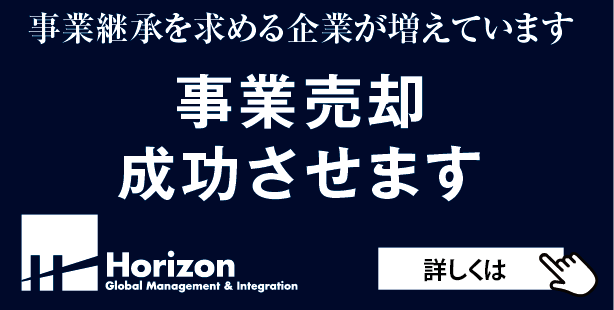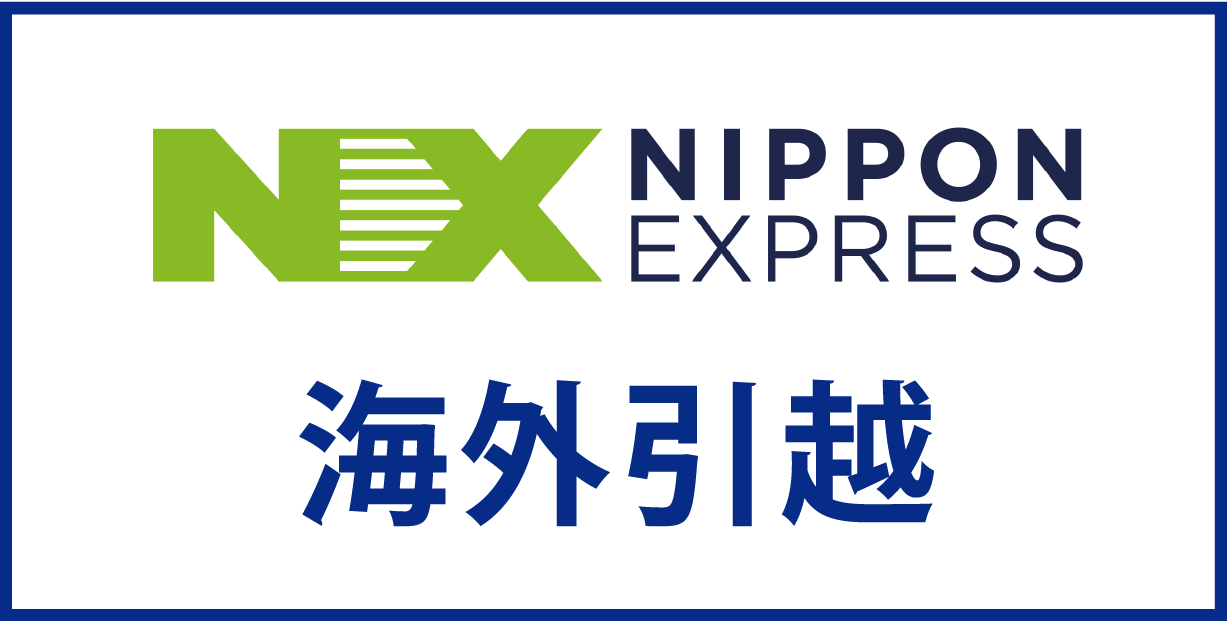Tricultural Voices from Keio Academy of New York #5
“The Comparison of Japan and South Korea in view of Globalization” November 13, 2024
At Keio Academy of New York (Purchase, NY)
Introducing Consul General Mr.Euywhan Kim’s Lecture
Tatsumi Takayuki
Headmaster, Keio Academy of New York
On October 2nd, 2024, Mr. Hidetoshi Takeda, editor-in-chief of Daily Sun New York, generously introduced me to Mr. Euywhan Kim, current consul general of the Republic of South Korea, who was involved with UNDP (United Nations Development Program) as a senior advisor on anti-corruption from 2017 through 2019.
Chatting with him, I was deeply impressed with the consul general’s deep knowledge of Fukuzawa Yukichi sensei, whose major work An Encouragement of Learning Mr.Kim read very closely. Since Keio Academy of New York, established in 1990, has proudly advocated the “Japan-U.S. Keio” tri-cultural ethos in its mission statement revised in 2022, we were thrilled to welcome him to our campus on November 13th, where he delivered an exciting lecture on the thoughts of Fukuzawa sensei in the context of globalization. As a result, Mr. Kim brilliantly captured our students’ imagination by emphasizing a couple of stimulating principles: “Leaders should be readers” and “Learn and win.”
Of course, a number of precursors have already speculated upon the significance of Fukuzawa sensei from a variety of perspectives; he has represented not only Keio Gijuku as an independent school but also modern Japan as a democratic nation. Nonetheless, Mr. Kim’s originality lies in his own project of hagiography; he reconsidered Fukuzawa sensei as comparable with major Japanese cultural giants.
In Anglo-American literary history the tradition of hagiography was modernized by Thomas Carlyle’s On Heroes, Hero-Worship, and the Heroic in History (1841), which helped reinforce Pax Britanica in the 19th century, whereas Carlyle’s work invited Ralph Waldo Emerson to compose a treatise on genius Representative Men (1850) , which paved the way for Pax Americana in the 20th century. It is notable that both Carlyle and Emerson admired Shakespeare and Napoleon as their major heroes. Likewise, following in the steps of Carlyle and Emerson, consul general Kim is ambitious enough to create his own hagiography by featuring Japanese cultural giants such as Oda Nobunaga, Kaneko Kentaro, Fukuzawa Yukichi, Matsushita Konosuke, Inamori Kazuo and Toyoda Kiichiro.
Why was he interested in the tradition of hagiography? At this point, his analogy between Pax Romana and Pax Americana will be helpful. It is self-evident that hegemonic nations have produced excellent hagiographies admiring and canonizing their own cultural giants. The early 21st century will see the first-ever East Asian Hagiography to be written by Consul General Mr. Kim. I truly look forward to reading it.

Responses from Mr.Dominic Ciafardini’s 12th grade
Advanced Cultural Studies and Research students
Dear Mr. Kim,
Thank you very much for your very interesting talk today. You also spoke to me from time to time, which made it even more enjoyable to listen to.
I think that the economic growth of Korea, which has been called a “ 30 year miracle”, is truly remarkable. Unlike Japan, which is an island nation that cannot be invaded unless it crosses the sea, Korea, which is part of a continent, has historically had difficulties in terms of diplomacy, but I think it is wonderful that it has overcome these difficulties and become an economic superpower.
Both Korea and Japan were closed off to the outside world for a long time, and rejected foreign cultures, so I think you can see how great the impact of globalization has been.
Also, when I visited Korea a year ago, I felt that the difference between Korea and Japan was the existence of chaebol. In Seoul, it seemed like these large companies such as Samsung and Lotte controlled most of the city. One of the negative aspects of globalization is that small and minor businesses cannot survive due to the MnC, but what is the situation like in Korea?
Thank you for your time today. I am a member of the Fukuzawa Research Club at this school, which was restarted this year, and I would like to deepen my understanding of the ideas of Yukichi Fukuzawa by reading his books.
-Mikako Furukawa
Dear Mr. Kim,
Through this invaluable opportunity, I was able to learn a lot about globalization.
I gained insights into the diverse approaches various countries have taken in their relations with the world, and how these strategies have influenced their development and international standing. For example, both Rome and the United States embraced global trade routes and encouraged immigration, which greatly contributed to their economic and cultural expansion. Their open stance fostered prosperous, diverse societies, attracting people from around the world in search of new opportunities. This approach to globalization showed how openness to cultural exchange and economic cooperation can strengthen a nation and foster prosperity in an interconnected world.
In contrast, countries like Korea, China, and Japan historically chose isolation, building both literal and figurative barriers to block external influences. This closed approach primarily aimed to preserve sovereignty and tradition but ultimately restricted these societies’ growth. Isolation limited economic development and slowed cultural exchange, weakening their global position compared to more open societies like Rome and the United States.Additionally, our examination of Japan’s Meiji era highlighted a fascinating departure from isolationist policies. Japan, aiming to avoid colonization, actively adopted Western ideas and rapidly modernized. Through this strategy advocated by Yukichi Fukuzawa, Japan selectively incorporated global influences to strengthen society while preserving independence, becoming an interesting example of adaptive globalization that maintained sovereignty yet embraced change.
Korea, too, has embraced globalization, projecting its unique cultural influence worldwide. The global popularity of K-Pop, Korean dramas, beauty products, and cuisine, which I also personally enjoy, exemplifies how Korea has used globalization to elevate its status. This cultural export shapes the country’s image and expands choices for people around the world.
This lecture reminded me that globalization connects to so many aspects of life, including making it possible for us to live in New York.
Thank you again for this invaluable lecture.
-Mao Miyake

Dear Mr.Kim
Good afternoon, thank you for your great speech and lecture. What a great time it was. It was interesting to listen to your speech. It is interesting listening to other points of view. Because I have a Korean friend, I felt like I was able to know his country better. I feel like I was able to know my country better by listening to the Sengoku era and the Fukuzawa sensei part.
I was very surprised by the 6th ranking of the world’s strongest country in the world and one of the most learned languages. Do you have a source on this, please?
Also, I loved how Korea is very confident with K pop which everyone has the same characteristics such as faces and only one genre.The Korean economy must be very great by these K pop works. Also, it was enjoyable listening to Great presidents of South Korea who embraced the concepts of globalization you were discussing.
Anyway, I want to praise your bravery in sharing these facts and ranking in the middle of the Japanese environment. Thank you for coming and I hope I can listen to your lectures again.
-Hirotaka Nagamatsu
Dear Mr. Kim
Thank you for a charming and informative talk on the impact of globalization, especially focusing on Korea and Japan. It was a great opportunity to learn more about how these two countries have navigated their economic growth and cultural identities.
I found it very interesting to learn about Korea’s rapid industrialization and the development of world-class technology. The explanation of Japan in the post-war period, when it adopted Western technology while preserving its traditional culture, was also very detailed and amazing.
I can sympathize with your description of how Korea has transformed its culture into a global export through K-Pop, Korean dramas, and Korean food. I think this represents a successful example of a cultural strategy that attracts people from all over the world.
I have a question about Japan and Korea. With the rise of digital media and global platforms like Netflix and YouTube, how do you see the strategies of Korea and Japan evolving in the future to maintain their cultural identity while embracing globalization?
Thank you again. Please come back and visit us at Keio NY some day.
-Miina Ishikawa













